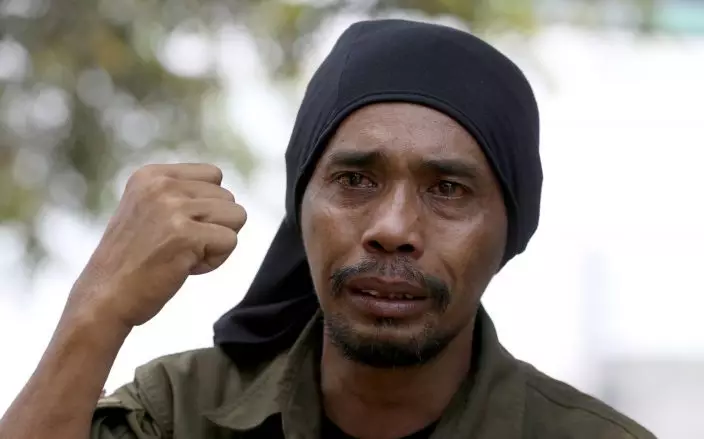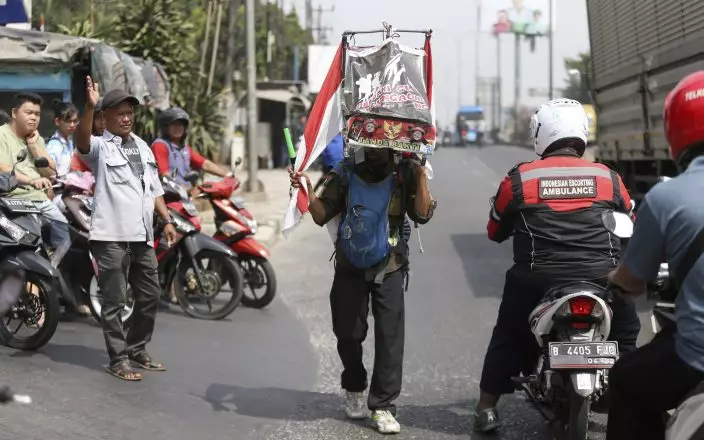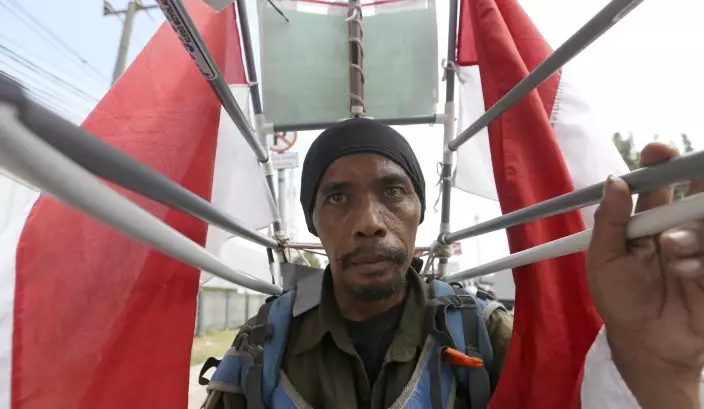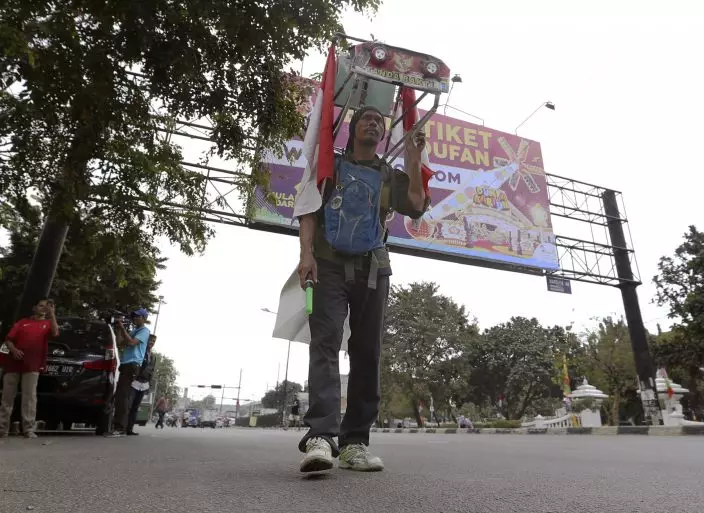An Indonesian man is walking more than 700 kilometers (430 miles) backward from his village in eastern Java to the country's capital to raise awareness about deforestation.
Medi Bastoni began his arduous expedition on July 18 from his home on the slope of Mount Wilis, a dormant volcano in East Java province that has been affected by deforestation.
Click to Gallery
An Indonesian man is walking more than 700 kilometers (430 miles) backward from his village in eastern Java to the country's capital to raise awareness about deforestation.
"I'm doing this to raise people's awareness of deforestation," Bastoni told The Associated Press on Thursday when he reached Jakarta's satellite city of Bekasi, about 22 kilometers (13 miles) east of the capital. "I need the president's support to help reforestation efforts, hand-in-hand with other communities."
Bastoni has attached a rearview mirror to his backpack that helps him avoid bumping into objects along his way. He walks at least 20 to 30 kilometers (12 to 18 miles) a day and sleeps in mosques or police stations along the way. In many cities and villages, cheering supporters offered him meals, drinks or a place to overnight.
Medi Bastoni walks backwards in Bekasi, outskirt of Jakarta, Indonesia, Thursday, Aug, 22, 2019. The Indonesian man is walking over 700-kilometer (430-mile) backward from his home in eastern Java to the country's capital to draw awareness of deforestation.(AP PhotoAchmad Ibrahim)
Medi Bastoni, left, walks backwards in Bekasi, outskirt of Jakarta, Indonesia, Thursday, Aug, 22, 2019. The Indonesian man is walking over 700-kilometer (430-mile) backward from his home in eastern Java to the country's capital to draw awareness of deforestation.(AP PhotoAchmad Ibrahim)
Medi Bastoni, 43, walks backwards in Bekasi, outskirt of Jakarta, Indonesia, Thursday, Aug, 22, 2019. The Indonesian man is walking over 700-kilometer (430-mile) backward from his home in eastern Java to the country's capital to draw awareness of deforestation.(AP PhotoAchmad Ibrahim)
The 43-year-old is expected to arrive in the capital, Jakarta, on Friday. He hopes to meet President Joko Widodo, and ask him to re-plant trees on Mount Wilis and elsewhere.

Medi Bastoni, 43, gestures as he talk to journalist in Bekasi, outskirt of Jakarta, Indonesia, Thursday, Aug, 22, 2019. The Indonesian man is walking over 700-kilometer (430-mile) backward from his home in eastern Java to the country's capital to draw awareness of deforestation.(AP PhotoAchmad Ibrahim)
"I'm doing this to raise people's awareness of deforestation," Bastoni told The Associated Press on Thursday when he reached Jakarta's satellite city of Bekasi, about 22 kilometers (13 miles) east of the capital. "I need the president's support to help reforestation efforts, hand-in-hand with other communities."
Indonesia for many years has chopped down its rainforests faster than any other country, profiting paper and palm oil conglomerates while causing social and environmental problems. Rapid forest loss and greenhouse gas emissions have made Indonesia the fourth biggest contributor to global warming after China, the U.S. and India.
This isn't Bastoni's first backward walk. The father of four completed a 73 kilometer (45 mile) walk last year from East Java's town of Tulungagung to the peak of Mount Wilis in a similar effort to raise awareness about deforestation.

Medi Bastoni, left, walks backwards in Bekasi, outskirt of Jakarta, Indonesia, Thursday, Aug, 22, 2019. The Indonesian man is walking over 700-kilometer (430-mile) backward from his home in eastern Java to the country's capital to draw awareness of deforestation.(AP PhotoAchmad Ibrahim)
Bastoni has attached a rearview mirror to his backpack that helps him avoid bumping into objects along his way. He walks at least 20 to 30 kilometers (12 to 18 miles) a day and sleeps in mosques or police stations along the way. In many cities and villages, cheering supporters offered him meals, drinks or a place to overnight.
He failed his target of reaching the capital a day before Indonesia's Independence Day on Aug. 17 due to a swollen leg that forced him to rest for a few days. Initially, he was scheduled to attend the ceremony at the presidential palace.
"I hope I can touch the heart of Pak Jokowi to start the re-green effort by giving me a tree," Bastoni said, referring to popularly name of the president.

Medi Bastoni, 43, walks backwards in Bekasi, outskirt of Jakarta, Indonesia, Thursday, Aug, 22, 2019. The Indonesian man is walking over 700-kilometer (430-mile) backward from his home in eastern Java to the country's capital to draw awareness of deforestation.(AP PhotoAchmad Ibrahim)

Medi Bastoni walks backwards in Bekasi, outskirt of Jakarta, Indonesia, Thursday, Aug, 22, 2019. The Indonesian man is walking over 700-kilometer (430-mile) backward from his home in eastern Java to the country's capital to draw awareness of deforestation.(AP PhotoAchmad Ibrahim)

Medi Bastoni, left, walks backwards in Bekasi, outskirt of Jakarta, Indonesia, Thursday, Aug, 22, 2019. The Indonesian man is walking over 700-kilometer (430-mile) backward from his home in eastern Java to the country's capital to draw awareness of deforestation.(AP PhotoAchmad Ibrahim)

Medi Bastoni, 43, walks backwards in Bekasi, outskirt of Jakarta, Indonesia, Thursday, Aug, 22, 2019. The Indonesian man is walking over 700-kilometer (430-mile) backward from his home in eastern Java to the country's capital to draw awareness of deforestation.(AP PhotoAchmad Ibrahim)
DETROIT (AP) — The Oakland Athletics no longer have to wonder where they'll play the next few seasons. That won't make the long goodbye any easier.
The A's reacted to the announcement that this will be their last year in Oakland with a mixture of sadness and relief.
“At least as a player, you know where you’re headed,” outfielder Seth Brown said Friday before a game against the Tigers in Detroit. “There’s obviously a lot of moving parts, a lot of stuff we’re not privy to, so it’s just been kind of a waiting game on our end. Where are we going to go? Where are we going to be? So I think just having that knowledge -- at least we know where we’re going to be playing next year.”
Vivek Ranadivé, who owns the Triple-A Sacramento River Cats, and Oakland Athletics owner John Fisher announced Thursday that the A’s will temporarily relocate to West Sacramento's Sutter Health Park for at least three seasons. The A's are moving to Las Vegas after a new ballpark is constructed.
The River Cats, who are affiliated with the San Francisco Giants, will continue to play at the same facility.
Fisher was unable to reach an agreement with Oakland city officials on extending the lease at Oakland Coliseum, which expires at the end of this season. The A's have played in the city since 1968.
“There's direction now, which we've talked a lot about,” Oakland A's manager Mark Kotsay said. “We've got time to kind of reflect on what this really means from an organizational standpoint, the history that we've had in Oakland, with this being now the final season. There's a lot of emotion that goes behind this.”
It will not only cause some upheaval for the players and staff but also members of the organization that work behind the scenes.
“At the end of the day, we know where we're going to be for the next three seasons after the finish this year and that in itself gives a little bit of stability,” Kotsay said. “At the same time, in the present, it's challenging in certain ways to think about the finality of this organization in Oakland.”
Sacramento will be a much smaller environment to house a major league team. Ranadivé said the River Cats venue currently seats 16,000 when counting the stands, the lawn behind center field and standing room only.
First baseman Ryan Noda is concerned with the facilities. He's hopeful that significant upgrades will be made, much like the Toronto Blue Jays did at Buffalo's Triple-A facility. The Blue Jays played at Buffalo's Sahlen Field in 2020 in 2021 during the COVID-19 pandemic.
“New walls, new dugouts, new locker rooms — everything they needed to become a big league stadium,” said Noda, who played some games in Sacramento as a minor leaguer. “As long as we can do something like that, then it'll be all right. But it's definitely going to be different than playing in stadiums that hold 40,000 people.”
Kotsay is confident the upgrades will occur.
“I know it will be of major league baseball quality,” he said. “It's has to be of major league baseball quality. I know the Players Association will make sure that takes place, as they did in Buffalo.”
For the rest of this season, the A's will have to deal with small home crowds and disappointed fans.
“We’re sad for the fans, the diehard fans, who always come to our games, always support us, always support the boys wearing the jersey,” Noda said.
AP MLB: https://apnews.com/hub/mlb

Sacramento Kings owner Vivek Ranadive, center, shakes hands John Fisher, owner of the Oakland Athletics, before the start of a news conference where Fisher announced his team will leave Oakland after this season and play temporarily at a minor league park, during a news conference in West Sacramento, Calif., Thursday, April 4 2024.The A's announced the decision to play at the home of the Sacramento River Cats from 2025-27 with an option for 2028 on Thursday after being unable to reach an agreement to extend their lease in Oakland during that time. (AP Photo/Rich Pedroncelli)

John Fisher, owner of the Oakland Athletics baseball team, announces that his team will leave Oakland after this season and play temporarily at a minor league park, during a news conference in West Sacramento, Calif., Thursday, April 4, 2024. The A's announced the decision to play at the home of the Sacramento River Cats from 2025-27 with an option for 2028 on Thursday after being unable to reach an agreement to extend their lease in Oakland during that time. (AP Photo/Rich Pedroncelli)

Sutter Health Park, home of the Triple A team Sacramento River Cats, is shown in West Sacramento, Calif., Thursday, April 4, 2024. The Oakland Athletics announced the decision to play at the home of the Sacramento River Cats from 2025-27 with an option for 2028 on Thursday after being unable to reach an agreement to extend their lease in Oakland during that time. (AP Photo/Rich Pedroncelli)

Oakland Athletics manager Mark Kotsay walks to the dugout after making a pitching change during the eighth inning of the team's baseball game against the Cleveland Guardians in Oakland, Calif., Sunday, March 31, 2024. (AP Photo/Jeff Chiu)












